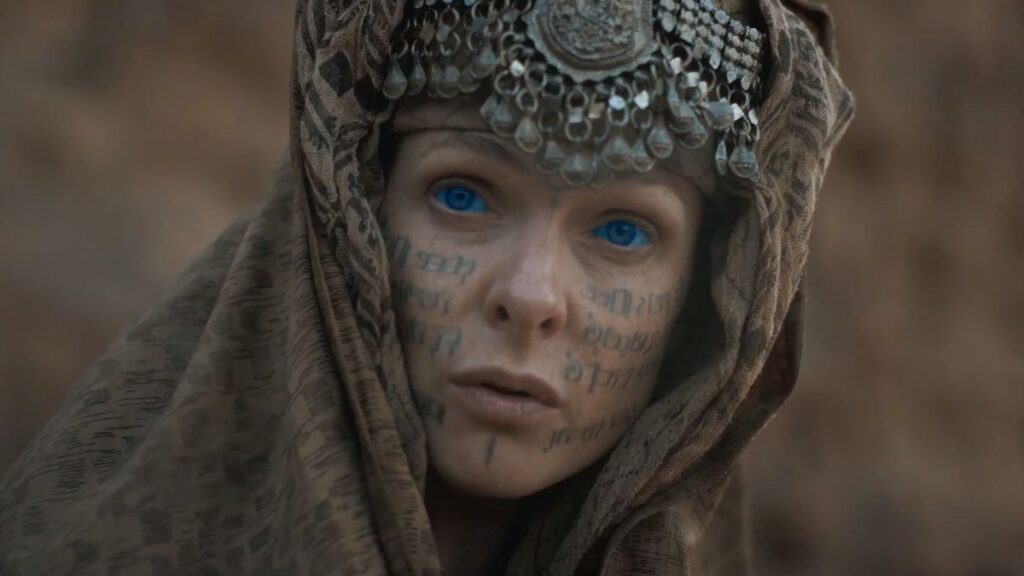War, Politic, religion, and Belief Evolve as “Weapons”
(This article contains some disclosed content from the movie. Please use discretion when reading…)
If we trace back every conflict in human history, big or small, it always stems from the roots of ideas, beliefs and the relentless struggle for power. When momentum builds up to the breaking points, it explodes into clashes, with beliefs serving as the forefront to justify every upcoming action.
We, as humanity, are creatures that value storytelling, beliefs, faith, religion, and tightly knit political systems like these… And that’s what “Dune Part 2,” the epic sci-fi film directed by Denis Villeneuve, based on the concluding part of Frank Herbert’s novel, presents. Beyond the dazzling scenes of the sci-fi epic, what lies beneath the beauty of the desert is not a giant sandworm but a political game, the outcome of leveraging faith, and the inevitable destruction born from conflicting beliefs.

“Dune Part 2” continues the sega from the first part, following the journey of Paul Atreides (Played by Timothee Chalamet), escaping the Harkonnen family’s deadly plot on the desert planet Arrakis. Here, he comes to understand the way of life of the Fremen, a desert tribe, and must choose to walk the path of the ‘Chosen One (Lisan Al Gaib),’ now known as Paul Muad’Dib Atreides, as he seeks revenge against the Harknonnen at the end of his journey.
The standout feature of Dune Part 2 is undoubtedly its visuals and cinematography by Greig Fraser. He masterfully transforms the sand dunes of Arrakis, making every frame tell a seamless story that feels like a captivating conversation. The ‘Show, Don’t Tell’ principle, a signature of Villeneuve, is vividly evident throughout the film.
Sound and music, courtesy of Hans Zimmer, continue to enchant, capturing the essence of the desert winds, the chants of the faithful, and the mythical sandworm Shai-Hulud. The music complements the visuals, making it a memorable aspect that might just be in the running for major awards.
The ensemble cast, including Timothee Chalamet, Austin Butler, Zendaya, and Javier Bardem, brings energy and chemistry, each character resonating seamlessly. Their performances add depth and complexity to the narrative, especially with characters like Paul, Feyd Rautha Harkonnen, Chani, and Stilgar.
Ultimately, the film attempts to convey a crucial point – the personal use and manipulation of faith.
Stilgar’s poignancy in every scene reflects the harsh reality that the Fremen, the desert tribe on Arrakis, have little hope to look forward to. Except for the prophecy of the ‘Chosen One,’ Lisan Al Gaib, which is actually a manipulated scheme created by the Bene Gesserit sisterhood centuries in advance.
Initially, Paul might not fully embrace his role as the ‘chosen’ leader of this native community. However, as the story unfolds, we witness his character’s development in terms of losing innocence and understanding the intricate political game tied to his family lineage and the valuable Spice on Arrakis.
In the end, when he decides to ‘play’ with those beliefs (partly in defiance…), what has been suppressed for a long time explodes. Faith becomes a weapon, used solely for the purpose of one man – Paul Atreides. Throughout the two hours and forty-five minutes, the film foreshadows the consequences of Paul’s choices, leading to an inevitable destiny.
In summary, ‘Dune’ is a cautionary tale about heroes. It advises to rely on individual judgment and accept the outcomes. As Frank Herbert, the author of the Dune trilogy, puts it, ‘Beware of heroes, much better rely on your own judgment, and your own mistakes.’
In the context of politics, religion, and faith, ‘Dune Part 2’ delves deep into the core of human nature. The conflicts in beliefs, the use of faith as a weapon for personal gain, and the political game where everyone pursues greatness, regardless of the path it leads to, remain unchanged over millennia.
Those who control Spice control Arrakis, and those who control Arrakis conquer the Universe.
Note: Denis Villeneuve is ready to create ‘Dune Part 3’ based on the second novel, ‘Dune Messiah,’ as the script is already completed. Hans Zimmer is set to compose the soundtrack. The ultimate result of Paul Atreides’ choices will unfold in the upcoming installment.